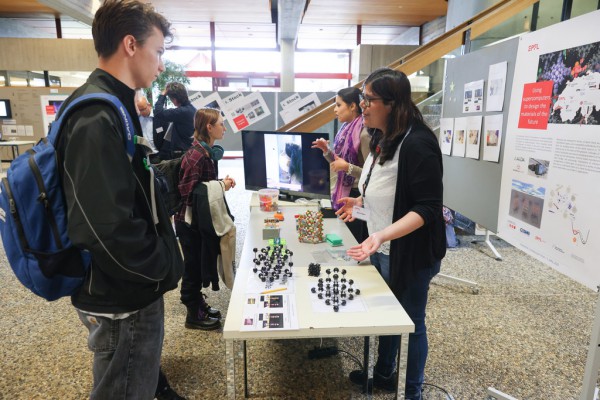MARVEL PhD students present research, encourage students at high school in Thun
By Carey Sargent, EPFL, NCCR MARVEL

"When talking about surface areas, it's usually just a number, you talk about m2 /gram so it made me think about how huge this surface is and I had to explain to them what this number really means," she said. "That was the main challenge that I took from this day. Both of us really tried to make it understandable and the units that we usually use in science often don't mean a lot to people outside of research. We had to work to make the connection between our scientific thinking and something understandable."
Jigyasa Nigam presented aspects of her work in atomistic machine learning, with a particular emphasis on why it is needed and how it could be useful. Explaining the length and time scales of the calculations encountered in simulations or computer RAM requirements in a manner accessible to laypeople was thought provoking, she agreed. As was a conversation she had that day with a student who wanted to study philosophy, not physical science, and challenged the two to change his mind.
"He was saying that he could explain everything with philosophy, that science wasn't needed, mostly because he didn't like math," she said. "He wanted to know why he should study science. We noted the existence of graphite and carbon, different arrangements of carbon atoms that lead to completely different observable properties, and asked how only philosophy could explain this difference. In the end, we agreed that science and philosophy are both asking why and how, that they are strongly intertwined and basically two sides of the same coin. We encouraged his thinking, but showed how science could add another interesting dimension to his understanding of the world."
Not liking, or not being good enough, at math or some other specific scientific topic in high school was another common concern, the two PhD students said. The high school students assumed that these elements meant they could not consider a future as scientists. They were also worried about the consequences of embarking on such a course of study only to find out that they don't like it. Miriam Pougin looked to reassure and encourage them, noting that she didn't like and hadn't been particularly good at physics in school either.
"This should never be a reason not to choose start on a scientific path, that's the message we wanted to convey to them," she said. "It's all about passion and curiosity and as long as you're passionate about what you're doing, you can learn everything. I also told them that a main thing I learned during my student years is not only what I am passionate about, but also what I don't want to do. You need to dare to take a chance and keep an open mind, not be afraid of making mistakes."
Jigyasa Nigam also pointed to her own experience to address another concern common to many of these students from Thun — having to speak French.
"They say the science at EPFL seems amazing, but how will I manage the French?," she said. "I told them that I came as an outsider to Lausanne too and I assured them that if I can do it, they certainly can as well."
Low-volume newsletters, targeted to the scientific and industrial communities.
Subscribe to our newsletter